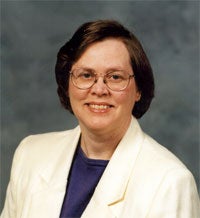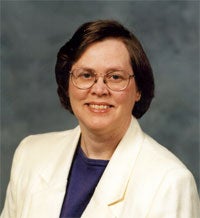 Donna Hughes invited to attend White House ceremony
Donna Hughes invited to attend White House ceremony
KINGSTON, R.I. — January 10, 2006 — After years of working on issues related to trafficking, sexual exploitation and violence against women and children, Donna Hughes, the Eleanor M. and Oscar M. Carlson Endowed Chair in Women’s Studies at the University of Rhode Island, today will attend a White House ceremony where President George W. Bush will sign a new law that cracks down on domestic sex trafficking.
“I never imagined that the U.S. House and Senate would unanimously pass, the President sign — and I would be present to witness — a law condemning the domestic sex trafficking of women and children – what’s commonly called prostitution,” said Hughes from Washington. “This new law represents to me the culmination of 17 years of research, writing, and advocacy work.”
Hughes said the new act will provide funds for a national movement to crackdown on perpetrators and provides services to victims.
“I’ve worked on this bill, particularly Title II, called the End Demand for Sex Trafficking Act, for the last two years. This act will fund many of the recommendations I’ve made to address the demand-side of sex trafficking in research reports to the U.S. State Department’s Office to Monitor and Combat Trafficking in Persons.
“When I started this work years ago, no one took what was being said seriously and there were few allies. Now, this law will officially support work underway to change the status quo and the results will be an example for countries worldwide,” said Hughes.
Title II of HR 972 and its companion legislation, introduced as HR 2012 (The End Demand Act) with broad bipartisan support, deal with one of the most critical unaddressed issues of the brutal trafficking and enslavement for commercial sex of women and children. Hughes’ research estimates that hundreds of thousands to well over a million people are trapped in prostitution in the United States alone.
Specifically, the new law provides for a comprehensive survey of the commercial sex industry in the United States, and a survey of the most severe forms of domestic human trafficking, to provide a fuller understanding of the scope and nature of the problem. It will also support annual conferences to lead to the formulation and dissemination of best practices to fight the problem domestically.
The act will also establish grant programs to extend and improve services for victims, residential treatment facilities for juvenile victims; and assist states and local law enforcement in prosecuting and rehabilitating purchasers of commercial sex acts, and training vice squads to better gain the trust and cooperation of victims.
A prolific writer and speaker, Hughes has testified before Congress, presented at the United Nations and numerous conferences worldwide and her work has helped to shape national and international policies on the global issues of trafficking and exploitation of women and children. Her work directly contributed to the human rights policy statements on prostitution, sexual slavery, and trafficking that were published in 2005 by the U.S. State Department’s Office to Monitor and Combat Trafficking in Persons.
Hughes, who joined the University in 1996, holds a Ph.D. in genetics and has extensive teaching experience in women’s studies. Her research has been supported by the National Institute of Justice, the National Science Foundation, the Association of American Colleges and Universities, the Norwegian Agency for Development Cooperation, the International Organization for Migration, the Council of Europe, the Coalition Against Trafficking in Women, the Rhode Island Board of Governors for Higher Education, University of Rhode Island Foundation, and the University of Rhode Island Council for Research.

